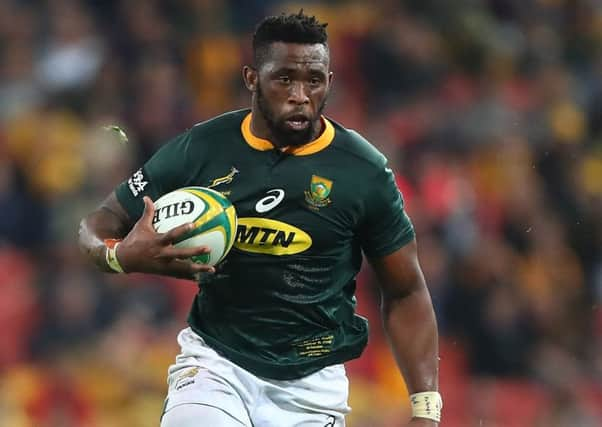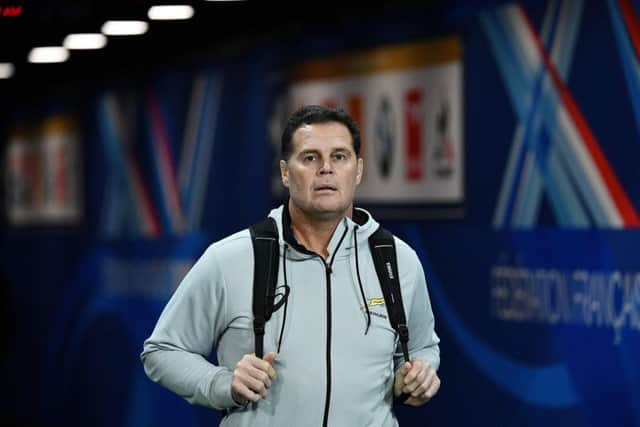South Africa captain Siya Kolisi unites country behind brand that once epitomised white minority rule


On his watch South Africa recorded a 44 per cent winning margin, the worst in their long and illustrious history. Following any number of hapless showings, specifically an infamous eight-tries-to-none 57-0 drubbing at the hands of the All Blacks in Albany, that embarrassing 20-18 defeat by the Azzuri in Florence and a 38-3 loss in Dublin, Coetzee was finally handed his jotters.
The former Springboks flanker Johan ‘Rassie’ Erasmus replaced him in March of this year and already, just eight months into the job, he has been hailed as the saviour of South African rugby despite a checkered Test record. It is early days but Erasmus, whose side face Scotland at Murrayfield on Saturday, boasts a 45.5 per cent winning record, exactly 1.5 per cent better than the man he replaced, and still their reputations are poles apart.
Advertisement
Hide AdAdvertisement
Hide AdHe is an old-school South African, unerringly polite, even charming, in public with a ruthless streak once the whistle has blown. Immediately before the announcement of his appointment, he was telling anyone who would listen that he was staying with Munster, but, in the end, he answered his country’s call, as he was always going to.


New coaches like to make something of a splash when they take the reins and Erasmus did just that by appointing Siya Kolisi as the new South Africa captain. Born to a 16-year-old mother who died when he was just 15, Kolisi was brought up by his grandmother and he recalls going to bed hungry while the family struggled to pay school fees of just £3 per year. Somehow he hauled his way up from poor beginnings in a Eastern Cape township to earn a scholarship to Grey High School and finally become the first black man to lead the Bokke.
It was a master stroke by Erasmus, uniting the country behind a brand that had once epitomised white minority rule. Kolisi is a natural in the role and, with a white wife and two mixed race kids, a potent symbol of South Africa’s future.
The 26-year-old flanker exudes gravitas and leadership and he can play a bit too, and no one on either side of the divide imagined for a moment that this was a token gesture. Don’t take my word for it, listen to what one of his predecessors had to say on the subject.
“When given additional responsibility, some guys struggle, others flourish,” said former Springbok skipper Jean de Villiers in an interview with the Financial Times. “Siya flourishes. Rugby has played an inspirational part in South Africa’s history but we need to tell new stories of inspiration. This is a very important moment.”
He was backed up in more intimate terms by another one- time captain, Eben Etzebeth, a close friend of Kolisi.
“Can I say I love another man? Because I really love the guy. It’s awesome for me to see him as captain, leading this team. I’ll be there to back him up all the way.”
Erasmus has embraced “transformation”, the tricky process by which South African Rugby fields a team that represents the entire nation rather than a small slice of it. Ninety-two percent of the population is black and the South African Rugby Union (SARU) has made a commitment that the Springboks will be 50 per cent black by next year’s Rugby World Cup in Japan. The process is well under way.
Advertisement
Hide AdAdvertisement
Hide AdThe coach has regularly selected between five and seven black players in his starting XV (there has never been more than seven black starters). The one exception was his most famous win against the All Blacks in Wellington when he selected just three. That victory, the first Springbok triumph in New Zealand since 2009, expunged the humiliation of Albany’s 57-0 shellacking and it bought Erasmus credibility amongst the rank and file and the time that comes with it.
“I am of the opinion that we must stop talking around racial transformation. We must talk about it,” Erasmus said in an interview ahead of the three-Test England series last summer.
“The target is 45 per cent this year (2018), measured over the 14-Test season, and if I do not reach the mark I have failed to reach one of my key performance indicators. If I do not make the 45 per cent target, I will be in trouble. We must see it like that. It is what it is and we must work around that.”
Erasmus has done more than coach a team to play to its strengths, under him the Springboks look like the Springboks again, thank goodness, brutally physical but with an added willingness to take risks and attack with the ball in hand. One week after that famous win in Wellington, the Bokke hosted the All Blacks at Pretoria’s Loftus Versfeld and lost an absolute humdinger. South Africa were leading by 30-13 inside the final quarter but the Kiwis scored 19 unanswered points to snatch a late, late win and break Springbok hearts.
It mattered at the time, it mattered plenty at the time, but not so much in retrospect, a little like Erasmus’s overall international record. The country is content, at least the rugby loving part of it. It is not where you come from, it is where you are going and under Erasmus, South Africa believe in themselves once more.
The former flanker holds the status of a prophet in a country where rugby remains a religion.